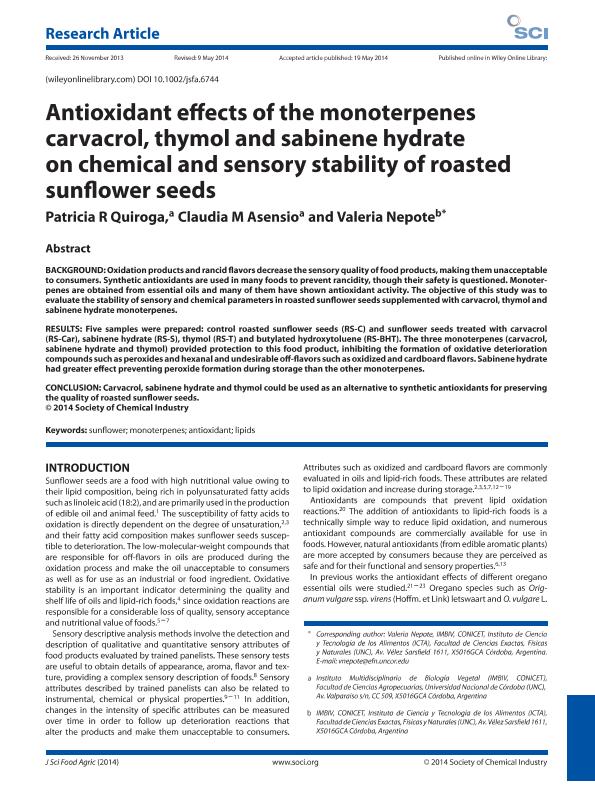Artículo
Antioxidant effects of the monoterpenes carvacrol, thymol and sabinene hydrate on chemical and sensory stability of roasted sunflower seeds
Fecha de publicación:
06/2014
Editorial:
Wiley
Revista:
Journal Of The Science Of Food And Agriculture
ISSN:
0022-5142
Idioma:
Inglés
Tipo de recurso:
Artículo publicado
Resumen
BACKGROUND: Oxidation products and rancid flavors decrease the sensory quality of food products, making them unacceptable to consumers. Synthetic antioxidants are used in many foods to prevent rancidity, though their safety is questioned. Monoterpenes are obtained from essential oils and many of them have shown antioxidant activity. The objective of this study was to evaluate the stability of sensory and chemical parameters in roasted sunflower seeds supplemented with carvacrol, thymol and sabinene hydrate monoterpenes. RESULTS: Five samples were prepared: control roasted sunflower seeds (RS-C) and sunflower seeds treated with carvacrol (RS-Car), sabinene hydrate (RS-S), thymol (RS-T) and butylated hydroxytoluene (RS-BHT). The three monoterpenes (carvacrol, sabinene hydrate and thymol) provided protection to this food product, inhibiting the formation of oxidative deterioration compounds such as peroxides and hexanal and undesirable off-flavors such as oxidized and cardboard flavors. Sabinene hydrate had greater effect preventing peroxide formation during storage than the other monoterpenes. CONCLUSION: Carvacrol, sabinene hydrate and thymol could be used as an alternative to synthetic antioxidants for preserving the quality of roasted sunflower seeds.
Palabras clave:
Sunflower
,
Monoterpenes
,
Antioxidants
,
Lipids
Archivos asociados
Licencia
Identificadores
Colecciones
Articulos(CCT - CORDOBA)
Articulos de CTRO.CIENTIFICO TECNOL.CONICET - CORDOBA
Articulos de CTRO.CIENTIFICO TECNOL.CONICET - CORDOBA
Articulos(IMBIV)
Articulos de INST.MULTIDISCIPL.DE BIOLOGIA VEGETAL (P)
Articulos de INST.MULTIDISCIPL.DE BIOLOGIA VEGETAL (P)
Citación
Quiroga, Patricia Raquel; Asensio, Claudia Mariana; Nepote, Valeria; Antioxidant effects of the monoterpenes carvacrol, thymol and sabinene hydrate on chemical and sensory stability of roasted sunflower seeds; Wiley; Journal Of The Science Of Food And Agriculture; 95; 3; 6-2014; 471-479
Compartir
Altmétricas




